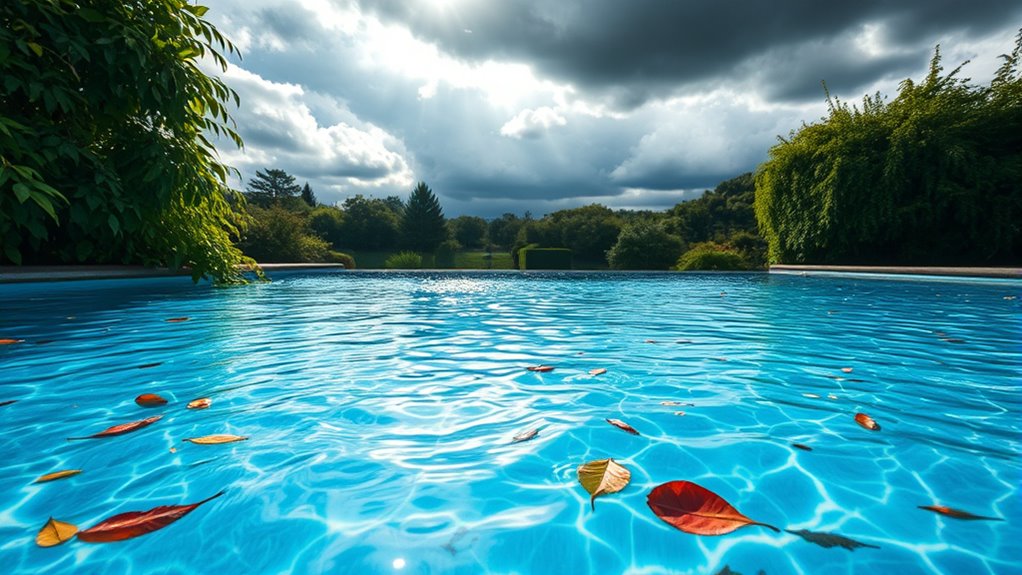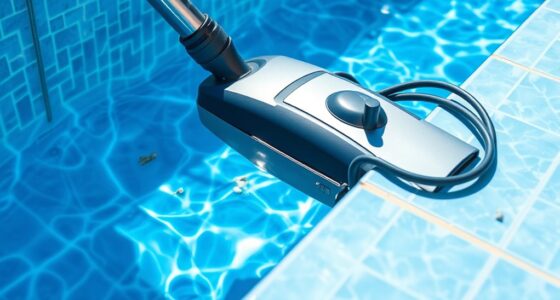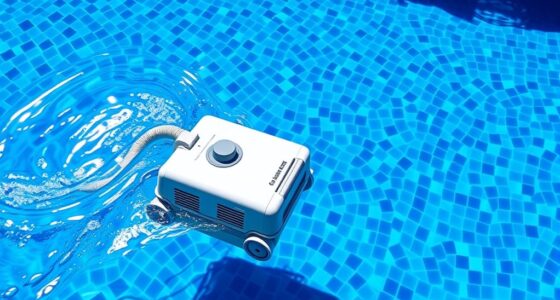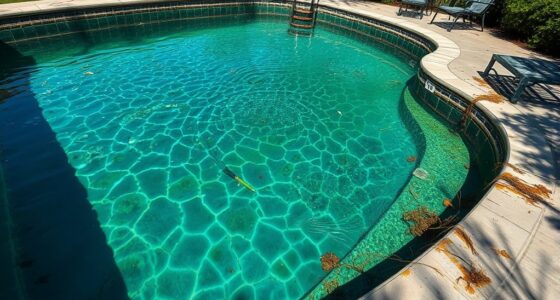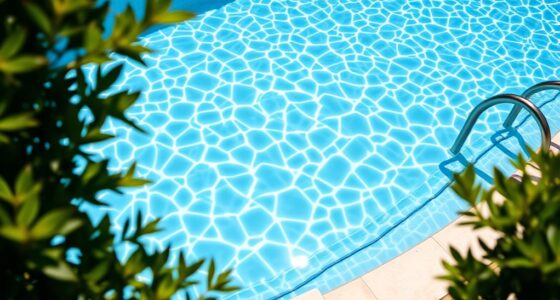After a storm, start by thoroughly skimming the surface and vacuuming the pool bottom to remove leaves, dirt, and debris. Test your water’s pH, chlorine, and other chemicals, then adjust them as needed to restore proper balance and prevent algae growth. Run your filter continuously for at least 24 hours and clean the baskets. Use clarifiers if water remains cloudy. Keep monitoring water quality and stay on top of necessary adjustments—more tips will help you get your pool sparkling clean again.
Key Takeaways
- Remove surface and settled debris using skimmer nets and pool vacuum if needed.
- Test water chemistry and adjust pH, chlorine, and other chemicals to restore balance.
- Check and clean the filter system; run it continuously for at least 24 hours.
- Use clarifiers or algaecides if water remains cloudy or algae develops.
- Regularly monitor water quality, re-balance chemicals, and keep the filtration system running.

Have you ever wondered what steps to take when your pool needs cleaning after a heavy rain? Heavy rain can introduce a lot of debris and disrupt your pool’s chemical balance, making it essential to take prompt action. First, you’ll want to focus on debris removal. Rain can carry leaves, twigs, dirt, and other unwanted materials into your pool, which can quickly clog filters and cloud the water. Use a skimmer net to remove surface debris thoroughly. Don’t forget to check the bottom of the pool for settled debris and use a pool vacuum if necessary. Removing debris immediately helps prevent clogging your filtration system and keeps the water clearer.
Once you’ve cleared the surface and bottom, it’s time to address the chemical imbalance that rain can cause. Rainwater is often slightly acidic or contains contaminants that can throw off your pool’s pH levels, chlorine, and other chemical balances. Test your pool water using reliable test strips or a digital tester. You’ll likely find that the pH has dropped, making the water more acidic, or the chlorine levels have decreased. To restore balance, adjust chemicals accordingly. Typically, you’ll need to add pH increaser or decreaser and re-dose chlorine to make sure the water is sanitized. Maintaining proper chemical levels is vital because it prevents algae growth, bacteria formation, and other water quality issues.
After rain, test and adjust your pool’s pH and chlorine levels to maintain water balance and prevent algae growth.
Additionally, consider checking your pool’s filter system to ensure it’s functioning properly after heavy rain, as debris and contaminants can strain the system. After balancing the chemicals, run your pool filter continuously for at least 24 hours. This helps circulate the water, distribute chemicals evenly, and remove any remaining debris that might be floating around. Keep an eye on the filter pressure gauge; if it rises considerably, clean or backwash the filter to sustain peak performance. If you notice cloudy water even after these steps, consider adding a clarifier or algaecide to improve water clarity and prevent algae blooms.
Regular brushing of the pool walls and floor after rain can also help dislodge any stubborn dirt or algae that may have started to take hold. Check your skimmer and pump baskets and clean them out to guarantee peak flow. It’s wise to keep testing the water over the next few days and make adjustments as needed. Rain can have lingering effects, so staying vigilant helps keep your pool safe and inviting.
Frequently Asked Questions
How Often Should I Check My Pool After Heavy Rain?
You should check your pool daily after heavy rain, especially in the first few days. Focus on water level management by removing excess water and ensuring the level stays balanced. During these visits, inspect your pool cover for damage or debris and clean it as needed to prevent contamination. Regular checks help maintain proper chemical balance and prevent issues like algae growth or cloudy water.
Can Rainwater Affect My Pool’S Chemical Balance Long-Term?
You might worry that rainwater dilution will cause lasting chemical imbalance in your pool, but it’s manageable. Rainwater can temporarily alter your water’s chemistry, but it doesn’t cause long-term damage if you act promptly. You need to perform chemical imbalance correction by testing your water and adjusting chemicals as necessary. Regular checks after heavy rain ensure your pool stays balanced, preventing issues and keeping your water safe and clean.
Is It Necessary to Drain Pool Water After a Storm?
You don’t always need to drain your pool water after a storm. Instead, you should start with pool water testing to assess chemical levels and clarity. Drain pool considerations come into play if you notice significant debris, algae, or if the water quality is severely compromised. Often, thorough cleaning and balancing chemicals are enough. Draining is a last resort and should only be done if contamination or water quality issues persist.
What Equipment Is Best for Removing Debris From the Pool?
Did you know that a typical backyard pool can collect over 50 pounds of debris during a storm? To efficiently remove leaves, dirt, and twigs, use a sturdy skimmer basket to catch larger debris and a robotic cleaner for thorough cleaning. Skimmer baskets are quick and easy to empty, while robotic cleaners scrub surfaces and vacuum dirt, saving you time and effort. Combining both guarantees your pool stays sparkling clean after a storm.
How Do I Prevent Algae Growth After Rainy Weather?
To prevent algae growth after rainy weather, you should focus on algae prevention strategies like maintaining proper chlorine levels and brushing your pool regularly. Use rainwater filtration systems to remove excess nutrients and debris that promote algae. Also, run your pool’s pump longer to circulate chemicals effectively. These steps help keep your pool clean, clear, and free from algae, even after heavy rain.
Conclusion
After a heavy rain, your pool needs some TLC to stay pristine. Just like Sarah did after a summer storm, quick skimming, brushing, and balancing the chemicals brought her pool back to crystal clarity in no time. Remember, tackling debris early prevents algae growth and cloudy water. With a little effort, you’ll enjoy your sparkling pool again—perfect for relaxing or entertaining. So don’t wait—clean and balance your pool today, and plunge into crystal-clear waters tomorrow!

